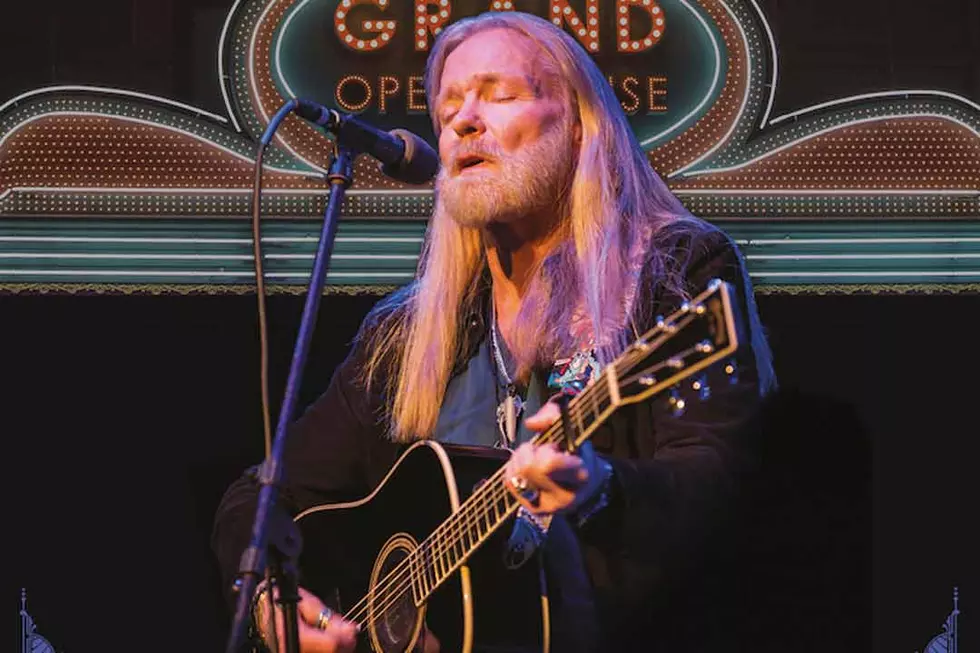
Gregg Allman Dies
Gregg Allman, the smoky-voiced B-3-playing Southern rock legend who soldiered on after his sibling's motorcycle crash nearly derailed the Allman Brothers Band, has died. He was 69.
Allman's website bears the following message.
It is with deep sadness that we announce that Gregg Allman, a founding member of The Allman Brothers Band, passed away peacefully at his home in Savannah, Georgia.
Gregg struggled with many health issues over the past several years. During that time, Gregg considered being on the road playing music with his brothers and solo band for his beloved fans, essential medicine for his soul. Playing music lifted him up and kept him going during the toughest of times.
Gregg’s long time manager and close friend, Michael Lehman said, “I have lost a dear friend and the world has lost a brilliant pioneer in music. He was a kind and gentle soul with the best laugh I ever heard. His love for his family and bandmates was passionate as was the love he had for his extraordinary fans. Gregg was an incredible partner and an even better friend. We will all miss him.”
Gregg is survived by his wife, Shannon Allman, his children, Devon, Elijah Blue, Delilah Island Kurtom and Layla Brooklyn Allman; 3 grandchildren, his niece, Galadrielle Allman, lifelong friend Chank Middleton, and a large extended family. The family will release a statement soon, but for now ask for privacy during this very difficult time.
The family suggests that tributes to Gregg can be made to the Gregg Allman Scholarship Fund at The University of Georgia or the Allman/Lehman Endowed Scholarship at Syracuse University.
Read more about the remarkable legacy of Gregg Allman.
Late in life, Allman acknowledged his own role in these mounting physical maladies. "My generation, we were all just such heavy drug takers," he told Stuff in 2011. "We didn't know no different. We didn't know no other way. It was what we did. And that's going to come back and hit ya – and it got me."
But not before Gregg Allman helped to redraw the landscape of classic rock.
Born on Dec. 8, 1947, Gregg actually started out on the guitar, before his older brother Duane Allman's sweeping talent became apparent. He had an interest in dentistry if music hadn't worked out – and, for a very long time, it seemed as if it wouldn't. Their first band together, called the Escorts, evolved into the Allman Joys by the mid-'60s. In short order, they moved to Los Angeles, renamed the group Hour Glass and signed with Liberty Records. The duo appeared to be on their way. Instead, however, they'd toil in relative obscurity until the early '70s.
"I mean, a couple of times I got real discouraged and thought, ‘Man, why don’t I just go back to med school and just say it was fun while it lasted,'" Allman told Clash in 2011. "Chalk it up to experience, you know? And I just couldn’t quite bring myself to do it, because I wanted to play."
After both Hour Glass albums flopped, Duane Allman left to pursue a career back in Alabama as a session guitarist at Muscle Shoals. Gregg spent an unhappy period alone in California, still contractually obligated to Liberty. About a year later, they reunited to cut another demo together – this time with a group that included future Allman Brothers Band stalwart Butch Trucks on drums. Second drummer Jai Johanny Johanson and bassist Berry Oakley, who Duane met doing sideman work, later joined – followed by Oakley's friend Dickey Betts. The Allmans' classic lineup was set.
Gregg served as principal songwriter for their first album, 1969's The Allman Brothers Band. The project set a template for their heady mixture of rock, blues, jazz and country, but fizzled at No. 188 on the Billboard chart. Over time, however, their tireless work ethic helped build belated momentum. The group's 1970 follow up, Idlewild South, managed to just nudge into the Top 40, and introduced Betts as a songwriting force.
Listen the Allman Brothers Band Perform 'Whipping Post'
"The good news was that the songs certainly were road-tested," Allman told Ultimate Classic Rock in 2014. "I mean, we were on the road for 300 days in 1970, man. Idlewild did much better than our first album ... but I still didn’t believe we were going to make it. I was always the Doubting Thomas of the bunch, and I don’t think I was convinced about the Allman Brothers until Fillmore East hit. That one removed all doubt!"
Released in 1971, At Fillmore East became their platinum-selling masterwork, and Gregg's career seemed to finally be on its way. That early plateau was followed, however, by devastating tragedy.
Just months after their long-awaited breakthrough, Gregg's 24-year-old brother Duane Allman was killed in a motorcycle accident. The group decided to continue under Gregg's defacto leadership, even as Betts took a more central collaborative role. They completed 1972's Eat a Peach using leftover material featuring Duane, scoring their best-ever chart finish at No. 4. The follow up, 1973's Brothers and Sisters, then became a chart-topping smash.
Music worked as a kind of therapy for Allman. "Being a Sagittarius, I'm pretty introverted," he told Gibson in 2011. "But I was forced to grow out of that when Duane died. When Duane passed away, we all got together and said, 'What do we do now?' I said, 'We either play, or we go crazy. Those are our choices.' So, we played. God, did we play. We were on the road for 306 days in 1970, and we stepped that up after my brother died."
Behind the scenes, however, the Allman Brothers Band were a mess. Oakley, who'd never gotten over his former bandmate's death, died in an eerily similar way on Nov. 11, 1972, wrecking his motorcycle just three blocks from where Duane Allman had been killed. There was an infamous backstage brawl during a June 1973 concert bill shared with the Grateful Dead at RFK Stadium in Washington D.C. Drug use became rampant, even as a member of the band's security team was convicted on cocaine charges.
Watch the Allman Brothers Band Perform 'Melissa'
"It was so hard to get into anything after that second loss," Gregg told Rolling Stone in 1973. "I even caught myself thinking that it's narrowing down, that maybe I'm next."
By 1973, he'd started a tandem solo career, releasing the No. 13 hit Laid Back. Win, Lose or Draw followed in 1975, before the Allman Brothers Band took a hiatus. Allman memorably paired off with pop star Cher, releasing a widely derided 1977 studio project together that failed to chart. When his own album Playin' Up a Storm also underperformed, the Allman Brothers Band reformed once more. Gregg wouldn't make another solo effort for a decade, even as his group struggled to find their footing in a sleek new decade.
Within a couple of years, the Allmans had split again, opening the door for Gregg's surprise 1987 hit I'm No Angel. The gold-selling album became his first Top 40 hit since Laid Back, while its title track rose to No. 1 on Billboard's mainstream rock chart. Unfortunately, 1988's Just Before the Bullets Fly didn't sustain that solo commercial momentum, and he found himself leading a reworked, but eventually far more stable lineup of the Allman Brothers Band once more. The addition of Warren Haynes, Allen Woody and then Duane Trucks seemed to energize the band, who earned higher marks for subsequent albums like 1990's Seven Turns and 2003's Hittin' the Note.
Allman was still struggling with dependency, however, a situation that marred the Allman Brothers Band's 1995 induction into the Rock and Roll Hall of Fame, when he was too drunk to remember the honor. Gregg attempted to get cleaned up again, but continuing disagreements with Betts finally led to his departure. Hittin the Note marked the final Allmans studio effort (and only album without Betts) before health setbacks began to beset Gregg.
Watch Gregg Allman Perform 'I'm No Angel
He had a liver transplant in 2010, and dealt with bulging discs among other illnesses before re-entering rehab in 2012. By then, the Allman Brothers Band were firmly focused on the road, becoming sold-out staples at the Beacon Theatre. Gregg made a long-awaited returned to the charts, but as a solo artist, notching a No. 5 roots-focused smash with Low Country Blues in 2011.
"One day at a time, man – that’s the only way to approach it," Allman admitted, in an interview with the Democrat and Chronicle. "I went through hell to get sober and healthy, and I don’t want to throw that all away."
The Allman Brothers Band announced a career-ending run of shows at the Beacon in 2014, where they concluded things with a 238th career sellout – but not before a short postponement as Allman dealt with bronchitis. In the years that followed the band's retirement, Gregg's physical issues apparently only worsened – but he never really considered quitting his solo work.
"Retire from what? Retire from having fun? No," Allman said in a 2016 talk with the Atlanta Business Chronicle. "I don’t know. If it gets to where it’s too hard on my body, I might play here and there two or three times a year – but hopefully that’s a long ways off."
Then, in March 2017, Allman cancelled concerts for the rest of the year. He'd already called off the remainder of his 2016 shows the previous November, both times without specifying what ailed him. Before that, in August 2016, Allman missed several concerts while battling pneumonia. He'd changed diets after a diagnosis of atrial fibrillation; a broken wrist also led to another postponement back in 2014.
He remained busy, however, confirming work on his first solo album since the Allman Brothers Band retired – even as the world bid farewell to long-time bandmate Butch Trucks, who died in January of 2017. Don Was was working as producer for the sessions, which were to be released as Southern Blood.
Rocker Deaths: Artists We Lost in 2017
More From 107.9 Jack FM










